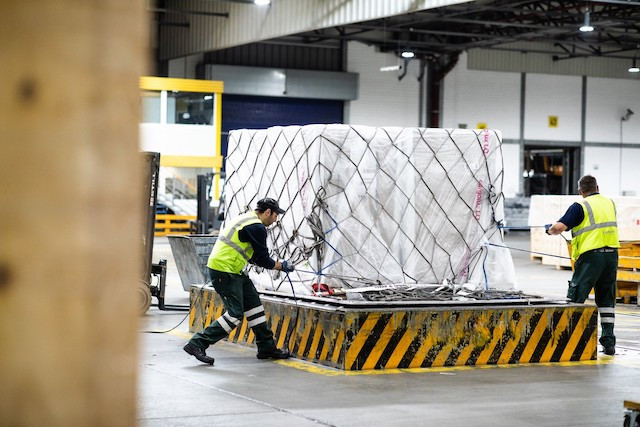The delivery of masks, ventilators, food to supermarkets, then vaccines, online sales... Transport and logistics have played an essential role since the start of the pandemic.
How did the sector experience the year 2020? It has "contributed to the economy a lot over the last 12 months," explains Malik Zeniti, Cluster for Logistics director, who presented his results during a Wednesday press briefing. “The industry has picked up quite quickly. In general, companies have come out of the crisis well, although some sub-sectors have suffered more, for example the transport of fresh produce for restaurants.”
In its report, the cluster describes "high volatility" throughout 2020, "suggesting careful planning in the short and medium term." Despite which some companies have "continued their investments in logistics warehouses extensions in the freight villages in Contern and Bettembourg/Dudelange for local and international customers with major forwarders, filling most available land with warehouse projects by 2022.”
Lack of containers
Volatility (lack of visibility over the coming months) remains very high for 6% of companies, high for 34% and average for 50%, according to a European study by the transport expert panel (TEP) carried out in April 2021. The cluster does not have Luxembourg data, but estimates that the country is following the same trend. Concerning the market, 17% find themselves in overcapacity compared to 42% at undercapacity and 16% in shortage of capacity. This is explained by the many crises that have affected the sector worldwide for several months.
Starting with the lack of containers. “China has emerged much faster” from the economic crisis linked to covid-19. “The country has fully resumed production and needed containers to move its products. When Europe needed them, they were all in China,” says Zeniti. Even in China, there would not be enough containers for exporting products. Because of sanitary rules, many of these transport boxes are said to have remained blocked in several countries.
In Luxembourg, "many of our industrial members are every day looking for alternative solutions for the delivery of their products,” the cluster director explains. The shortfall is also having the opposite effect for some ocean freight companies who are profiting from it, he adds. Other shortages have slowed activity in certain sectors, such as automotive semiconductors or construction materials.
Transport is faced with another problem, that of the disaffiliation from Luxembourg social security of cross-border drivers exceeding 25% of their working time in their country of residence. "A big problem that affects many companies which have found as their only solution to send the French to Germany and the Germans to France," he says. The sector expects a lot from the negotiations between countries to solve this issue.
The ecocombis trail
Another challenge: greening up. "The national energy and climate plan has set a target of reducing CO2 emissions for transport by 38% by 2030. It is very ambitious and we do not really have a solution," Zeniti says. Twelve cluster member companies joined the “lean and green” programme, plus three in 2021, out of just over 100 members. It aims to reduce greenhouse gas emissions by 20% in five years. "By training drivers in eco-driving, we can save 7 to 10% in consumption," he explains. "But 30% is very ambitious."
The Cluster for Logistics sees "eco-combinations" as a lead. These are trucks that exceed the usual limit of around ten metres in length to reach up to 25 meters. They are used or tested in certain countries such as the Netherlands or Belgium… but not in the Grand Duchy. Industry representatives would like them to be authorised, in order to save money and energy, and deal with the shortage of drivers.
The number of members of the Cluster for Logistics did not change in 2020. They pay a membership fee ranging from €120 to €3,600, depending on their status to take advantage of the organisation's network and influence. The board of directors, chaired by Carlo Thelen, has 17 members.
This article was originally published in French on Paperjam and has been translated and edited for Delano.
